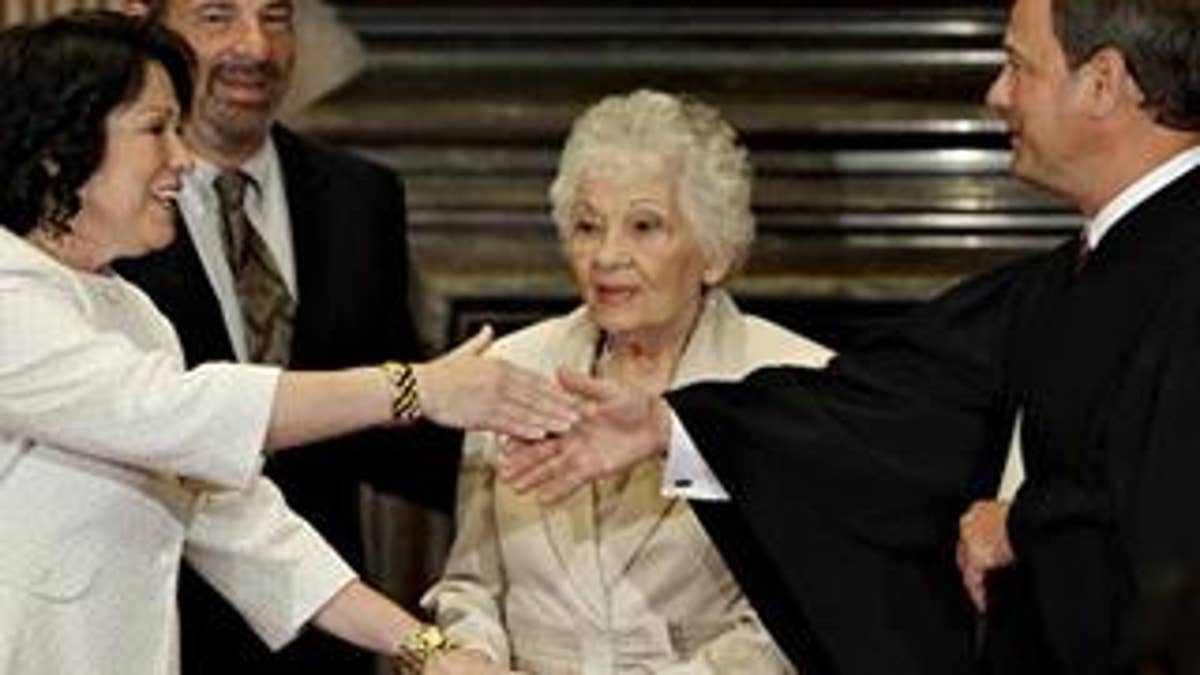
Now that Sonia Sotomayor has become the newest member of the nation's high court, she won't have much time to adjust to her new role.
Although the new term doesn't formally kick off until Oct. 5, the justices scheduled arguments in a key campaign finance case for Sept. 9. And one of the first cases the justices will face during the fall term involves the long-running legal fight over an 8-foot cross that stands as a war memorial in the vast Mojave National Preserve in California.
Sotomayor, who replaced retired Justice David Souter, is not expected to change the ideological split on the high court. Justice Anthony Kennedy will still be the wild card on a bench with four conservatives and four liberals.
Yet some legal analysts say Sotomayor's decisions may offer surprises.
"I'm not sure people are right in assuming that she's going to replace Justice Souter in terms of the perspective and the opinions she writes," Joanne Epps, dean of Temple University Law School told FOX News. "I think she will surprise some of her critics and not be quite as unwelcome as they might suspect."
"I think she will add to the discussion a perspective of someone who did not come from privilege and who understands therefore the different ways in which law touches people," she said. "I think she's going to be a good justice. I think she's going to be a moderate justice. I think she's exquisitely fair. And I think that more people will be proud of her and her decisions than know that today. "
Sotomayor's first decision will come next month in a case that could lead a change in how political campaigns are funded.
Sotomayor and the other justices will review a scathing documentary financed by longtime critics of Secretary of State Hillary Clinton that may settle the question of whether the government can regulate a politically charged film as a campaign ad.
At issue in the case is the 90-minute anti-Clinton movie and television ads that Citizens United, a conservative non-profit organization, wanted to air during the 2008 primaries advertising the film.
Federal courts said the ads would violate the McCain-Feingold law, the popular name for the 2002 revisions to the nation's campaign finance laws. Judges called "Hillary: The Movie" a 90-minute attack ad, rulings that would require Citizens United to identify the financial backers for the ads if they were to appear on television.
The court also said that if the group showed the movie on cable television, financial backers would have to be named and the group would have to pay the cost of airing the movie.
Citizens United appealed to the Supreme Court, arguing that the film should not be considered a political ad. The group says there is nothing in the movie urging people to vote against Clinton. The group says the film is more of a documentary comparable to critical television news programs such as "Frontline," "Nova" and "60 Minutes."
The Obama administration is defending the law, saying that the film is "unmistakenly an appeal to viewers to vote against" Clinton.
When the fall term begins, one of the most prominent cases before the court will regard the Mojave Desert Cross, a memorial to World War I veterans that an appeals court declared unconstitutional.
The American Civil Liberties Union and a former National Park Service employee have been challenging the cross' continued presence on national parkland for nearly eight years. A cross has stood on the site since 1934, when a local chapter of the Veterans of Foreign Wars erected it atop an outcropping known as Sunrise Rock.
Congress has transferred ownership of the land on which it sits to a private party.
The San Francisco-based 9th U.S. Circuit Court of Appeals twice said the cross must come down. I invalidated the 2004 congressionally approved land transfer, saying that "carving out a tiny parcel of property in the midst of this vast preserve -- like a donut hole with cross atop it -- will do nothing to minimize the impermissible governmental endorsement" of the religious symbol.
The Associated Press contributed to this report.




